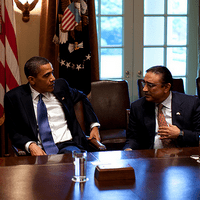The Peruvian government’s suspension of coca eradication operations last week raised the question of whether newly elected President Ollanta Humala might embrace a pro-coca legalization policy in line with that of President Evo Morales in neighboring Bolivia. In addition to suspending eradication, Humala also replaced Peru’s top counterdrug and intelligence officials. However, according to Coletta Youngers, a senior fellow at the Washington Office on Latin America and specialist in international drug control policy, neither development signals an aggressive shift in Peru’s counternarcotics policy. Youngers cautioned Trend Lines this morning not to “read more into what has happened with [Peru’s] eradication […]
Aid and Development Archive
Free Newsletter
Iran announced last month that it would send aid to Malawi, shortly following cuts in aid to the Southeast African country by the U.S. and the U.K. In an email interview, Scott Lucas, an expert on Iran at the University of Birmingham, discussed Iran-Africa relations. WPR: What is the current state of Iran’s development aid and investment in Africa? Scott Lucas: Iran has continued, despite — and arguably because of — international sanctions, to make a significant effort to further its diplomatic and economic ties with African countries. High-ranking Iranian officials, including the foreign minister, have toured the continent, and, […]

As the Republican-controlled House advances its legislative agenda, U.S. civilian assistance to Pakistan looks likely to be one of the early casualties. In addition to new conditions on assistance to Pakistan, approved by two House panels, White House officials expect that the overall aid package is likely to shrink as well. But before lawmakers cut aid to Islamabad, they should consider the role it plays in realizing long-term U.S. interests. The Enhanced Partnership with Pakistan Act of 2009, more commonly known as the Kerry-Lugar-Berman Act, tripled financial assistance to Pakistan’s civilian institutions by pledging $1.5 billion annually for five years. […]

At the dawn of the 20th century, the world population was inching toward a modest 2 billion. In the 111 years since, notwithstanding the impact of war, genocide, disease and famine, the global population has soared, reaching 3 billion around 1960 and now quickly approaching the neighborhood of 7 billion. By 2050, the planet will likely be home to 2 billion more. We may not be witnessing the detonation of the “population bomb” that Paul Ehrlich warned of in his seminal 1968 book, but such rapid demographic change is clearly pushing the international community into uncharted territory. With a limited […]
While the horrific famine in the Horn of Africa has captured international attention, a similar emergency on the other side of the world, in North Korea, has quietly moved past the point of crisis. The World Food Program in April called for $224 million in emergency aid for North Korea. But the international community — particularly the United States and South Korea, traditionally the largest donors to North Korea — have so far refused to fund the request. Their resistance, according to Roberta Cohen, a nonresident senior foreign policy fellow at the Brookings Institution in Washington, can best be explained […]
